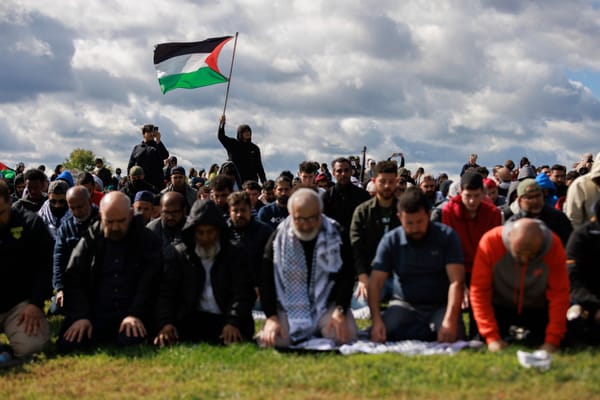This past weekend, large crowds took to the streets across the United States to protest Israel’s assault on Gaza and call for a ceasefire. The gathering in Washington, DC, was reportedly the largest pro-Palestinian protest in American history, with around 100,000 participants. This and other gatherings nationwide were organized by groups like the Council on American-Islamic Relations, as well as progressive and socialist organizations. All of this suggests that the Palestinian cause has, at least for now, brought back together a coalition of Muslim Americans and progressives that had begun to fray in recent years amid recent culture-war battles over gender and sexuality.
Not long ago, Muslim groups were working alongside conservative Christians in several states to roll back pro-LGBT curricula in public schools. This new alliance brought into the open the hitherto-hidden contradictions between socially conservative Muslims and the progressive wing of the Democratic coalition. Today, however, Muslims find themselves newly at odds with the American right, with which they might have shared an antipathy to gender ideology and the like, over the wider conservative movement’s unwavering support for Israel. Thus Muslims find themselves taking to the streets alongside young people holding “Queers for Palestine” signs. How these conflicts and realignments play out promises to have significant implications for the Democratic Party in next year’s presidential election and beyond, but also for the nation more broadly.
For decades, Muslims in America benefited from the multicultural regime presided over by progressives, which allowed them to preserve their cultural apartness and offered protection in the aftermath of 9/11 and other jihadist terrorist attacks, and served as a bulwark against the anti-Muslim rhetoric espoused by Donald Trump and others on the right. The ideology of multiculturalism also offered the Muslim-American intelligentsia a terminology to describe the community’s experience and its commonalities with that of other American minorities: They were victims of “racial profiling”; veiled women were in the “intersectional” position of being women and Muslims; Muslims were a “post-colonial” people resisting Eurocentrism; and so on.
All the while, Muslims also benefited from the conservative defense of the freedom of religion. They could be part of interfaith dialogue. They could buy up unused churches in small towns and turn them into mosques. They could be invited to the White House at the end of Ramadan for Iftar with the president. In the multicultural era, Muslims enjoyed the status of black Americans as a valued client in the Democratic machine, and of orthodox Jews as a minority benefiting from religious freedom. What could be better? They had the culturally prestigious status of an oppressed people, but also the protected status of a conservative religious group.
